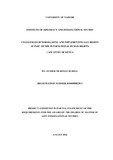| dc.description.abstract | Two fundamental human rights are the prohibition against discrimination and the
guarantee of equal and effective protection against discrimination on any ground to all
people. However, these principles have not been applied equally to those who face
discrimination based on their sexual identity. There is still a prescribed death penalty
in eight countries for homosexual behaviour. In addition, homosexuality is
criminalized in approximately 80 countries. In Uganda, there is an on-going debate
about a proposed “anti-homosexuality bill,” which would inflict the death penalty on
repeat offenders. In Moscow, Russia, gay pride, which entails an openly admitting
being a homosexual and demonstrating a sense of dignity in their sexual orientation,
has been banned for the next 100 years. The international community recognises
human rights as “the foundation of freedom, justice and peace in the world.” Key
human rights developments have taken place at the international level, but
international human rights law cannot be observed separately from the national
human rights laws of those countries that have ratified international treaties.
Sovereign states are the central actors, and they assume the daily obligations to
protect and respect rights. Therefore, this thesis looks at the role of the state in
normalizing and implementing gay rights. It also looks at the characteristics of gays
that have kept them out of the human rights work | en_US |

